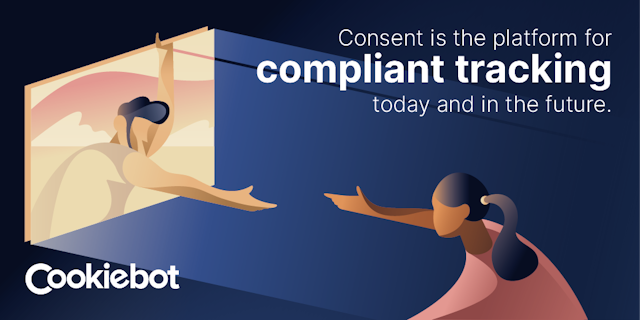User consent is the key to building trust online – now and in the future
Most tracking for advertising purposes on the internet today happens through cookies – small text files stored on a user’s browser that enable websites to collect data on their users and share it with third parties who serve targeted advertisement or offer website analytics in return.

Building trust with your end users now and in the cookie-less internet economy will be vital
Cookies have until now functioned as the main vehicle for data collection in the internet economy. With Google’s determination to phase out the use of third-party cookies in Chrome by 2022 (with other browsers already blocking them), the entire internet economy is being pushed towards a cookie-less future, in which new tracking technologies will be weighed against the same questions on privacy compliance.
Consent equals both data privacy compliance and brand reputation
Building trust with your end users now and in the cookie-less internet economy will be vital since data privacy is fast becoming a metric of brand reputation itself. When asked why they left a brand, 80% of consumers say they left because the brand was using their data without consent.
In North America, according to a survey conducted by Mckinsey in 2020, 71% of consumers said that they would stop doing business with a company if it gave away sensitive data without permission.
Consent is not only becoming a consumer demand, but also the gold standard for most of the data protection laws that are emerging across the world, strongly influenced by the EU’s strict General Data Protection Regulation (GDPR) that requires data controllers/processors to obtain explicit consent from end users before any collection and processing of their personal data can take place. In the US, California and Virginia have already passed comprehensive state-wide data protection laws that empower residents with the rights to say no to having their data sold to third parties or used for targeted advertisements, and a dozen states look to be next.
Collecting compliant consents means that the end user is provided with transparency on the data collection potentially taking place, and can object to it completely or partially for specific purposes before any of it is collected and processed. Consent is more than the law – it’s the key to a sustainable internet economy that strikes a balance between targeted online advertisements that pays for much of the free internet content, and empowering end users who demand control over their data after years of a growing public data privacy awakening.
Being able to demonstrate end user data privacy protection through fully compliant consent management is becoming akin to consumer goods having sustainability marks on packaging – metrics by which users will increasingly measure a brand before making their choices.
The risks to brand reputation in tracking user data for ad purposes without proper consent are high and growing – complaints and data protection enforcement cases for violations, including getting fined, can quickly reach the public space and endanger the trust built between you and your users. On the other hand, the benefits for your brand reputation from protecting user privacy and respecting their consent and their rights will no doubt increase as the ad tech industry itself moves from third-party cookies towards other data collection methods that can be even harder to understand for end users, but still require consent.

New technologies, same consent need
Looking to replace third-party cookies is Google’s trust tokens and Flocs (Federated Learning of Cohorts). These would process data with a greater level of anonymization on the user’s browser (unlike third-party cookies today), but they would still collect and process personal data (such as search and browsing history processed when placing users in aggregated ad target groups or ‘flocks’ that advertisers can target for marketing). Without the empowered consent of end users, these new technologies will face the same risks and issues as third-party cookies today.
So, while third-party cookies may be playing a smaller part or entirely disappear soon, consent is still becoming the foundation for compliant tracking today and in the future, regardless of the tracking technologies in use.
New consent-based services like Google Consent Mode, which lets websites run all Google-services based on the consent of their end users, are also a clear sign that even Google now recognizes that consent must be at the center of data privacy and tracking.
Key takeaways for the cookie-less future
-
Third-party cookies are going to play a lesser role, and new technologies will replace them – but end user consent is here to stay.
-
Being able to offer a fully compliant consent mechanism is becoming a mark of good brand reputation and best practice, an industry standard and a core privacy law requirement.
-
Avoid fines, data privacy violations and risk to brand reputation damage by integrating consent into your user tracking.
-
Sign up to Cookiebot consent management platform, or join our 2,000+ global reseller force offering world-leading consent management to websites everywhere.
Cybot, the parent company of Cookiebot CMP, has been working since 2012 to strike a balance between end-user privacy and the adtech industry through unmatched automated technology and simple end-user consent management.
Companies and agencies can become resellers of Cookiebot CMP and offer the world-leading consent management platform to their customers and their end users.
The unmatched Cookiebot CMP scanning technology finds all tracking technologies (old and new alike) in use on websites and automatically controls them based on the user consent state given through simple but industry-leading consent interfaces that are highly customizable and can be tweaked to fit websites of any shape, size and feel.
Try a free scan with Cookiebot CMP that shows you all tracking technologies present on your website and sign up to become a Cookiebot CMP reseller today.
Content by The Drum Network member:

Cybot
Consent Management Platform (CMP) We shed light on online data tracking & empower website operators to build trusting relationships with users. #ePrivacy #G...
Find out more
